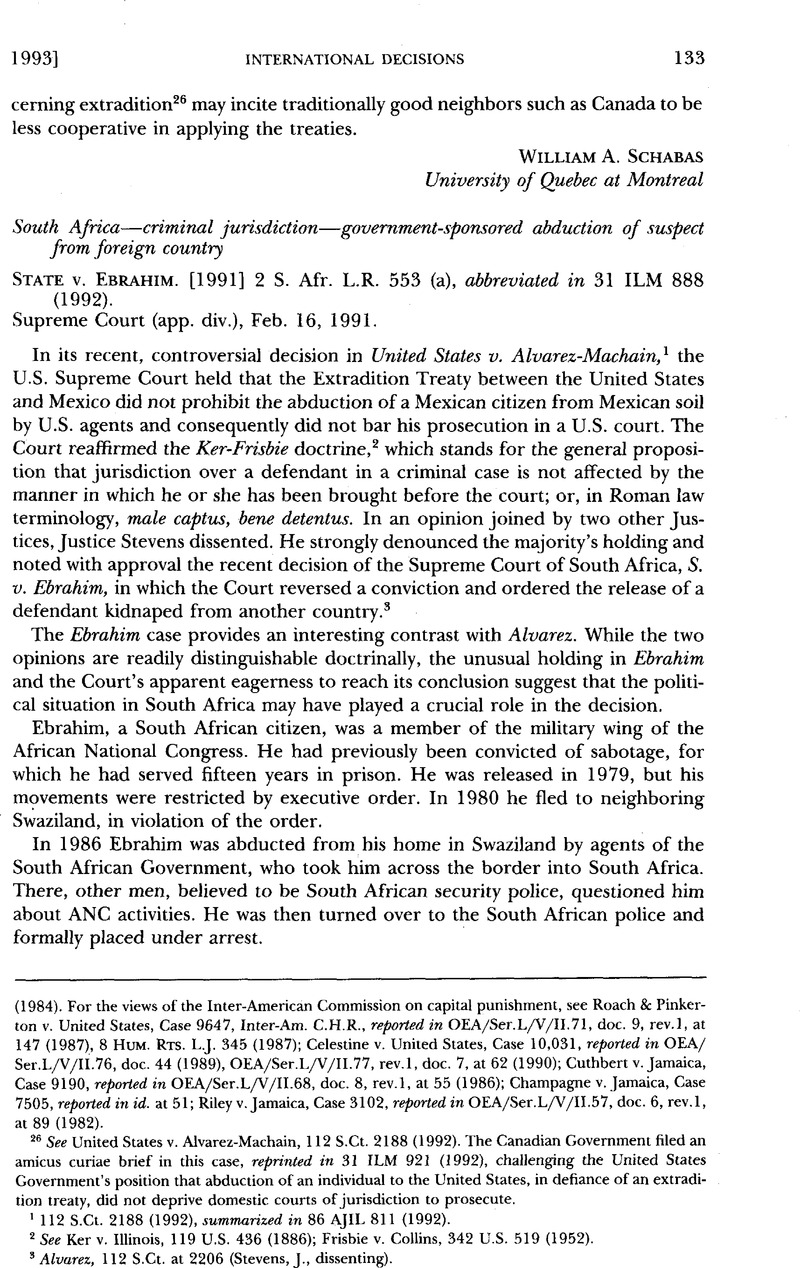Article contents
State v. Ebrahim
Published online by Cambridge University Press: 27 February 2017
Abstract

- Type
- Decisions of Regional and Foreign Courts
- Information
- Copyright
- Copyright © American Society of International Law 1993
References
1 112 S.Ct. 2188 (1992), summarized in 86 AJIL 811 (1992).
2 See Ker v. Illinois, 119 U.S. 436 (1886); Frisbie v. Collins, 342 U.S. 519 (1952).
3 Alvarez, 112 S.Ct. at 2206 (Stevens, J., dissenting).
4 31 ILM 888, 890.
5 Id. at 896. The Court dismissed English precedent out of hand even though South African common law “has been strongly influenced during the past two hundred years by the English common law.” Id. at 892 (Ed.’s note).
6 Roman-Dutch law, upon which South Africa’s common law is largely based, comprises “principles of Roman law and Germanic custom, as developed in the seventeenth and eighteenth centuries by the writings of jurists and the decisions of the courts in Holland and its associated provinces in the United Netherlands.” Id.
7 Id. at 894.
8 U.S. Const. Art. IV, §2, cl. 2. Cf. 18 U.S.C. §3182 (1988) (implementing constitutional provision).
9 127 U.S. 700 (1888). See also Frisbie v. Collins, 342 U.S. 519 (1952); Pettibone v. Nichols, 203 U.S. 192, 207–09 (1906); Cook v. Hart, 146 U.S. 183, 190 (1892).
10 Ebrahim, 31 ILM at 894.
11 See F. A. Mann, Reflections on the Prosecution of Persons Abducted in Breach of International Law, in International Law at a Time of Perplexity 407 (Yoram Dinstein & Mala Tabory eds., 1989), reprinted in Further Studies in International Law 339, 346 (1990) (“With rare unanimity … the courts of the world have held that the manner in which an accused has been brought before the court does not and, indeed, cannot deprive it of its jurisdiction …”); United States v. Cordero, 668 F.2d 32, 36 (1st Cir. 1981).
12 500 F.2d 267 (2d Cir.), reh’g denied, 504 F.2d 1380 (2d Cir. 1974).
13 On remand, the district court found that Toscanino had failed to demonstrate any U.S. involvement in his alleged mistreatment, and, accordingly, denied Toscanino’s motion to dismiss the indictment. United States v. Toscanino, 398 F.Supp. 916 (E.D.N.Y. 1975).
14 510 F.2d 62 (2d Cir.), cert, denied, 421 U.S. 1001 (1975).
15 Ebrahim, 31 ILM at 890.
16 Cf. United States v. Reed, 639 F.2d 896 (2d Cir. 1981) (allegation that CIA agents had abducted defendant from Bahamas, had forced him to lie on floor of plane, had held cocked gun to his head while threatening to blow his brains out, and had twisted his arm to force him across runway, even if true, did not require divestiture of jurisdiction under Toscanino and Lujan).
17 During the past several years, the doctrinal underpinnings of Toscanino have been severely eroded, and arguably eviscerated. The Seventh Circuit, relying upon a 1989 Supreme Court decision, expressly repudiated Toscanino. Matta-Ballesteros v. Henman, 896 F.2d 255, 261–63 (7th Cir.), cert. denied, 111 S.Ct. 209 (1990) (citing Graham v. Conner, 490 U.S. 386, 395 (1989)). See also United States v. Rosenthal, 793 F.2d 1214, 1232 (11th Cir. 1986), cert, denied, 480 U.S. 919 (1987) (rejecting Toscanino); United States v. Winter, 509 F.2d 975, 986–88 (5th Cir.), cert, denied, 423 U.S. 825 (1975) (same). But cf. United States v. Wilson, 732 F.2d 404, 411 (5th Cir.), cert, denied, 469 U.S. 1099 (1984) (suggesting that Toscanino might be followed if government conduct is sufficiently shocking).
18 Abraham Abramovsky, Extraterritorial Abductions: America’s “Catch and Snatch” Policy Run Amok, 31 Va. J. Int’l L. 151, 159 (1991).
19 Ebrahim, 31 ILM at 897.
20 See, e.g., Ahmad v. Wigen, 726 F.Supp. 389, 401 (E.D.N.Y. 1989), aff’d, 910 F.2d 1063 (2d Cir. 1990). Under most extradition treaties, political offenders are not extraditable.
21 Under international human rights law, the term “refugee” includes a person who, “owing to well-founded fear of being persecuted for reasons of race, religion, nationality, membership of a particular social group or political opinion, is outside the country of his nationality and is unable or, owing to such fear, is unwilling to avail himself of the protection of that country.” Convention Relating to the Status of Refugees, July 28, 1951, 189 UNTS 150, reprinted in 19 UST 6259, 6261. Cf. INS v. Stevic, 467 U.S. 407 (1984).
22 See Views of Human Rights Committee on Complaint of López, July 29, 1981, UN GAOR, 36th Sess., Supp. No. 40, at 176–84, UN Doc. A/36/40 (1981). The Committee, established pursuant to the International Covenant on Civil and Political Rights, Dec. 16, 1966, 999 UNTS 171, reprinted in 6 ILM 368 (1967), ruled that the abduction in Argentina, by Uruguayan agents, of a Uruguayan refugee violated the Covenant. The Committee also ruled that Uruguay was obligated to free the arrestee and allow him to leave the country. See Andreas F. Lowenfeld, U.S. Law Enforcement Abroad: The Constitution and International Law, Continued, 84 AJIL 444, 474–75 (1990). South Africa is not a signatory of the Covenant. See Multilateral Treaties, Index and Current Status 304–05 (M.J. Bowman & D.J. Harris eds., 1984); and id. at 1966–67 (Supp. 1991).
- 1
- Cited by


